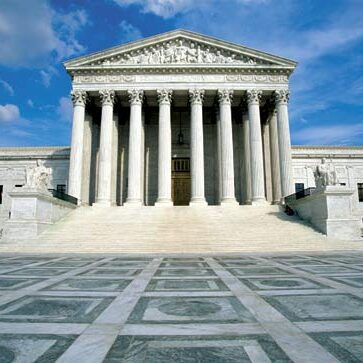Insights < BACK TO ALL INSIGHTS
Supreme Court Ruling on Sports Betting Case Could Level the Playing Field
Supreme Court Ruling on Sports Betting Case Could Level the Playing Field
By: Jeff Ifrah
This month Ifrah Law submitted an amicus brief to the United States Supreme Court in Christie v. NCAA, a pivotal case with far reaching implications for the gaming industry and state coffers across the country.
The case asks whether New Jersey can offer sports betting in regulated casinos and race tracks in New Jersey. A federal law called Professional and Amateur Sports Protection Act (PASPA) seems to say no.
In considering the constitutionality of the PASPA, the Supreme Court will decide if the federal government can pass a law that allows some states to offer sports betting (i.e. Nevada, Delaware) but not others? The question raises equal sovereignty issues that even a middle schooler acknowledges as contrary to our nation’s history and founding principles.
By allowing four states only to permit sports betting, we argue that Congress overstepped its authority by regulating an activity that had previously been the sole purview of the states, and it did so in a way that was capricious and unfair. Without any justifiable reason for this disparate treatment, some states were allowed to reap an unfair advantage by being able to grow their betting businesses, while others were denied this opportunity.
Our brief also argues that the law fails to achieve the Congressional objective of curtailing the negative community impacts of sports betting. It is not even rationally related to this goal, nor to safeguarding the integrity of professional sports.
In fact, as demonstrated by both the experience of members of the trade association iDEA and academic research on the impact of gaming, this industry is expanding in many positive ways, aided by revolutions in online technology. It is our position that all states seeking to broaden their revenue and employment opportunities should be free to welcome this burgeoning industry.
Sports betting is of course already very popular throughout the United States. Offshore sites in Costa Rica and elsewhere accept millions of dollars of bets and wagers from American customers every week. The majority of businesses in this sector operate outside the United States due to legislative and regulatory barriers like PASPA.
These barriers result in a tangible loss of potential revenue to the states without legal sports betting. Compare that with Nevada, where the activity is legal and generates nearly $5 billion a year. When states are not permitted to implement and regulate their own sports betting, billions of dollars every year are spent elsewhere, usually with offshore accounts and illegal bookies.
Repealing PASPA will not only lead to a regulated sports betting market in the states that choose to jump on such an opportunity, it will also break the log jam that has prevented other new gaming verticals from taking off. A Supreme Court decision in favor of New Jersey’s sports betting law could be a major step in removing these obstacles and paving the way for states to reap economic benefits in a carefully crafted regulatory environment.
As gaming continues to expand, aided by the revolutions in online technology, states seeking to increase tax revenue and jobs should be free to welcome this industry to their jurisdictions. Statistics and revenue calculations clearly demonstrate that this growing field can be effectively regulated and channeled into positive job growth, income and tax revenue.
A ruling by the country’s highest court that PASPA is unconstitutional is the first step towards leveling the playing field for all the states and providing equal access to potential economic benefits.





